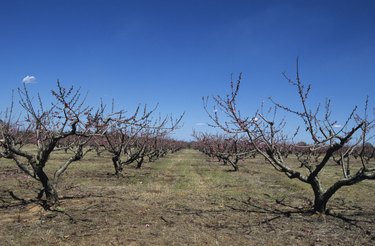Things You'll Need
Shovel
Soil pH test
Camera

Oftentimes, new homeowners will inherit a fruit tree from the previous owner, or a gardener can have an unidentified tree growing in the yard. During the winter, most fruit trees go into dormancy and lose their leaves. Loss of leaves and the general appearance of a bare fruit tree makes identifying the specific tree type difficult. If your neighbors and garden center don't know what type of tree you have, there are other telltale indicators that can help you determine what type of fruit tree you own.
Step 1
Check the United States Department of Agriculture's Plant Hardiness Map to find out your region's zone. The map is broken up in average minimal temperature zones, and all fruit trees can survive a specific minimal temperature. For example, most citrus trees are not cold hardy and typically do not grow in zones 6a to 1; therefore, you can probably check citrus trees off the list of possible choices if you live in zone 6a or smaller.
Video of the Day
Step 2
Look on the ground for any indicators of leftover fruit. If fruit isn't located directly underneath the tree, it may have been taken to other areas of the yard by wildlife.
Step 3
Conduct a soil pH test on the tree's planting site. Fruit trees require a specific pH range in order to grow. For example, apple trees need between 6.0 and 6.5. However, sweet cherry trees need a range between 6.5 to 8.0. Purchase a soil testing kit from your county extension office. Dig a 6-inch hole to collect soil samples. Mail the samples to the laboratory's address provided on the kit, and wait for the results to use for narrowing your choices of trees.
Step 4
Examine the trunk of the tree. For example, apple trees generally have one central leader (main horizontal trunk).
Step 5
Monitor your tree in early spring when the majority of fruit trees begin to blossom. Use a picture of the flowers to help determine what type of fruit your tree will produce. Cherry trees have small pinkish or white blossoms, and apple trees sprout large pink blossoms.
Warning
Avoid providing fertilizer for the tree before determining its correct type.
Video of the Day